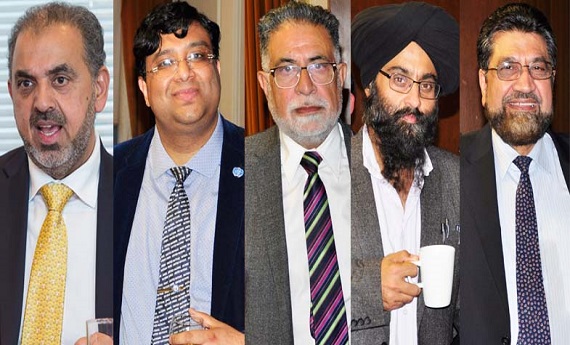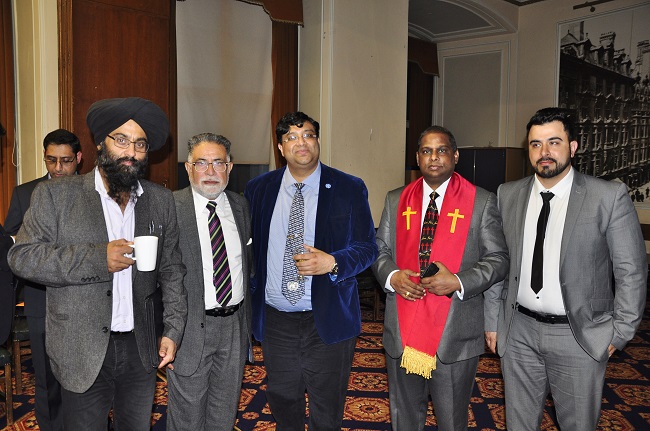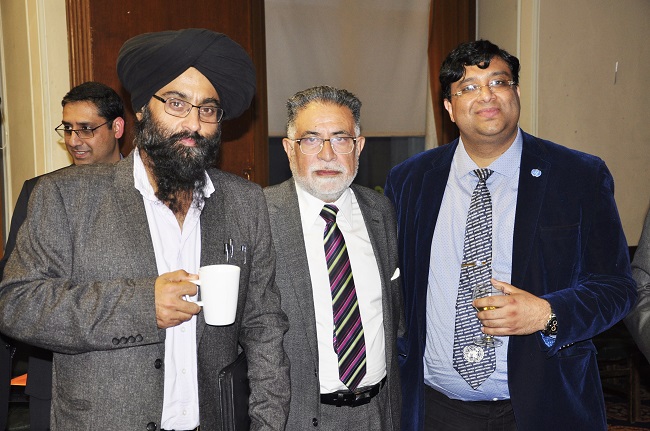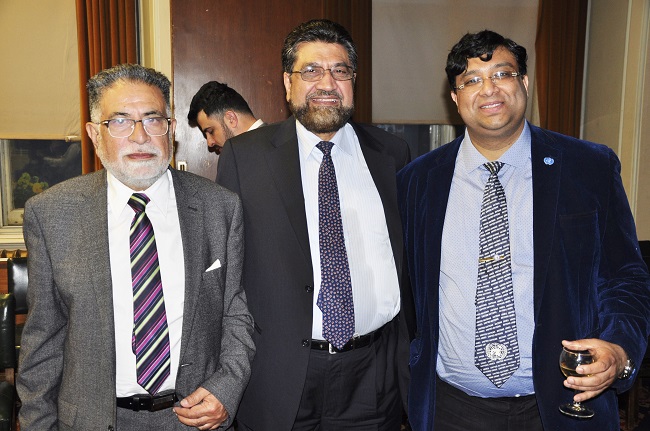HINDUTVA AGENDA A CHALLENGE TO INTERNATIONAL LAW AND CIVILISED NORMS


Birmingham: At a major international conference held in the main Chamber of the Birmingham Council House politicians, academics, religious and national representatives as well as leading diaspora organisations came together to call for international intervention to counter the threat posed by an increasingly rabid extremist Hindutva agenda in India. That agenda has denied not only the rights of nations to self-determination in their homelands but even the free practice of other faiths without intimidation and violence.
The key, according to the resolutions adopted at the conference was to require Indian compliance with international legal obligations and, in case of default, to punish defiance with targeted sanctions, including the banning of fascist group that are responsible for almost daily attacks on minorities. Lord Ahmed (Chair, Parliamentarians for National Self-determation), who chaired the conference, had earlier in the week raised formal questions in the House of Lords seeking the UK government action based on the recommendations of a report issued last month by the US Commission for International Religious Freedom.
Dr Iqtidar Cheema, who authored that report, presented to the conference the array of legal and constitutional measures by which religious minorities in India were being targeted, such as Sikhs Buddists and Jains being deemed to be Hindus for the purposes of personal laws.

His namesake, Harpal Singh Cheema (president of Dal Khalsa) participated by video link from Punjab, along with senior human rights lawyer Amar Singh Chahal. They castigated the Indian state for the genocide of the Sikhs, the denial of freedom and the illegal appropriation of Punjab’s river waters in breach of riparian law. On the anniversary of the 1986 Declaration of Khalistan they said the Sikh nation will pursue its right of self-determination in a peaceful and democratic manner, in accordance with international law. There was, they said, no option other than an independent and sovereign Punjab to bring to an end the decades-old conflict there.

Professor Shawl, chairman of Kashmir Concern, said the people of Kashmir alone must decide their destiny and India’s posting of 800,000 troops in the region will never alter that fact, despite the atrocities being committed by them. Mehmoob Makhdoomi, a Kashmiri author and columnist, urged the international policy and decision makers to facilitate efforts for true conflict resolution in the troubled region, based on the will of the people. India’s vision, which he characterised as the “peace of the graveyard” was no solution – the rise of a new generation of Kashmiri freedom supporters witnessed in recent months has amply demonstrated that.
Reverend Joshva Raja John, Church of England Priest and Queens Foundation research scholar expressed dismay at the rampant minority bashing being tolerated by the Indian authorities. Christians have been targeted by violence and intimidation under the guise of the repugnant ‘ghar vapsi’ mantra of Hindu extremists. He called for the Bajrang Dal and VHP offshoots of the BJP’s RSS mentor to be internationally banned as terrorist organisations.
Christina McKelvie, a Member of the Scottish Parliament, said other nations should aspire to self-determination just as the proud people of Scotland are doing and that the pursuance of national self determination through peace and democracy is a noble cause. Phil Bennion (former Member of the European Parliament) of the Liberal Democrats spoke of the paramount need for the right of self determination to be respected in disputed territories like Kashmir and called on India to drop its threat to execute Sikhs prisoners.

John Burn of the Green Party called on India honour its international obligations and to show zero tolerance to attacks on minorities. He also called on the UK government to stand up for human rights and the right of self-determination, rather than allow trade interests to override those “most basic and important” vales. Graham Williamson, chair of Nations without States, spoke of the need to allow self-determinists to operate peaceably within conflict zones, without the threat of sedition and treason laws, in order to unlock peaceful and democratic solutions to intractable
The conference was also addressed by Dr Mukul Hazarika (Assam Watch), Prof Dr Mohammed Arif Khan (Kashmir based educationalist and author), Amrik Singh Sahota (President, Council of Khalistan), Nazir Qureshi (President, All Parties Kashmir Coordination Committee), Dr Gurnam Singh (academic and TV presenter), Dr Jeffrey Kitingan and Doris Jones from the Sabah region of Malaysia, Joga Singh (Babbar Akali Organisation) and Ranjit Singh Srai (PNSD).
RESOLUTIONS ADOPTED AT THE CONFERENCE
- This Conference calls on the international community to fully recognise the role that self-determination can play as a means of peaceful conflict resolution; this is a democratic mechanism underpinned by international law. Whilst nations and peoples must be left to decide their own destiny, the global community must do what it can to hold non-compliant states to account when they refuse, overtly or covertly, to respect the right of self-determination. In the case of India, which officially rejects Articles 1 of the 1966 Covenants on Human Rights, this non-compliance has led directly to the unresolved and hugely destructive conflicts in Kashmir, Punjab, Assam and Nagalim over sovereignty, territory and riparian rights.
- The denial of religious freedoms, attacks on religious minorities in the name of chauvinistic ‘majoritarianism’, as being currently witnessed in the Hindutva extremism sweeping across India, is condemned as a breach of international law as well as basic moral standards of behaviour adopted by the civilised world. This Conference fully endorses the recommendations of the recent report of the US Commission on International Religious Freedom entitled “Constitutional and Legal Challenges Faced by Religious Minorities in India”. This Conference calls on the international community to identify and impose targeted sanctions against Hindutva organisations, including the RSS and all its affiliates across the world, to force a change in the cowardly tactics that are being adopted to intimidate Dalits, Christians, Muslims, Sikhs and others.
- This Conference urges all UK based political parties to address the concerns of the diaspora communities so that UK political representatives, including the UK Government, responds to the threats caused by blatant breaches of international law by the Indian state. The UK should not allow trade to obscure its commitments to human rights. Appeasement is no answer to fascism – a lesson which history ought to have taught us by now.

